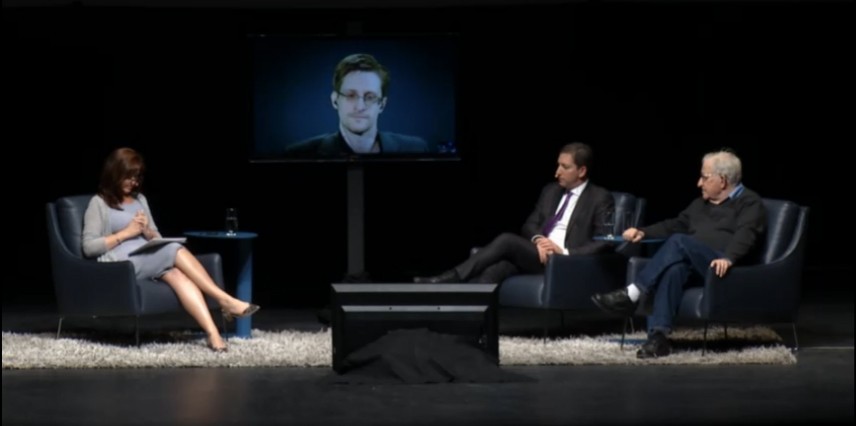The UA College of Social and Behavioral Sciences hosted a panel on privacy in the digital age in Centennial Hall on Friday.
The panel featured former National Security Agency contractor Edward Snowden, journalist Glen Greenwald and linguist Noam Chomsky. Snowden participated in the event from Russia via Skype. President and CEO of the Center for Democracy and Technology, Nuala O’Connor, moderated the privacy talk.
Privacy is hard to come by in the digital age. One of the major talking points of the panel was whether privacy was a constitutional right. While the U.S. Constitution has no specific laws containing the word “privacy,” Greenwald argued the Fourth Amendment, which prevents unlawful search and seizure, does give U.S citizens the right to privacy.
Greenwald said he believes people should have the right to privacy on their computers similar to the type of privacy they have in their homes. His main point was probable cause is necessary to obtain a warrant and search someone’s home, and what one does on their computer should be held to a similar standard.
Another talking point in the discussion was how U.S. citizens view digital privacy. A significant argument in favor of digital surveillance claims that many people don’t mind the government viewing their internet activities because they have nothing to hide.
“I would say that, arguably, if you don’t care about privacy because you have nothing to hide, it’s like saying you don’t care about free speech because you have nothing to say,” Snowden said.
Greenwald echoed Snowden’s sentiment toward privacy.
“We all have things to hide,” Greenwald said. “People who say they don’t value privacy still put locks on their bedroom and bathroom doors, they put passwords on their email and social media accounts, they do all sorts of things to make sure there’s a place they can go in the world and be free to think and reason and explore, without the judgmental eyes of other people.”
Greenwald tackled a question about whether people actually care about digital privacy by bringing up Apple’s not unlocking the phone of the man who committed the San Bernardino shootings.
Greenwald’s point was that after he and Snowden released the information from the NSA, large technology companies became less helpful of government agencies because they knew how much people care about privacy. These companies feared they would lose a considerable amount of customers if the customers didn’t feel like their privacy was being kept.
The idea of the digital self was also discussed. In the digital world we live in today, there is currently a debate about whether the things people do on the Internet count as extensions of themselves. The panel generally agreed that what a person does on the Internet is an extension of his or herself and should be kept private.
“Before the talk, I was along the lines of those who would say that digital privacy isn’t that important because I have nothing to hide,” said Kaitlin Dickson, an animal sciences senior.
Dickson went on to say that after listening to the talk, she has changed her mind.
“I think the government collecting data without a good reason is wrong,” she said.
Follow Nicholas Johnson on Twitter.









